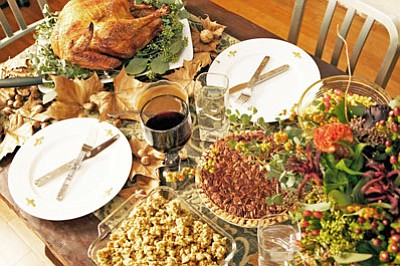BALTIMORE — Holiday tables are loaded with traditional, family-favorite foods. Remarkably, it is the time of the year when the most calories are consumed! The downside is that with all its excess of fat, alcohol, and overeating, the holidays can easily become an ‘invitation to sedation.’ Reports suggest that the average person can ingest 3,500 calories or more per meal; that many calories in one meal can easily cause a ‘food hangover’ and weight gain. Studies state that many people gain 10 pounds between Thanksgiving and New Year’s.
Isn’t it crazy that we continue to eat those yummy holiday foods long after our stomachs have begun to shout “ENOUGH?!”
The reason we do so is because our taste buds and brain short-circuit from the overload, causing us to eat more and more of that salty, sweet and fatty fare, until we are so stuffed that we cannot easily breathe, may feel suffocated, and our pants are just too tight!
Not only that, but family holiday meals are a social occasion, and when friends are overeating, we tend to overeat as well. Then we zone out, and what started out as a festive family affair soon turns into a failure to connect!
Let’s try to better understand what’s going on here, and come up with a game plan that will leave us happy, healthy and fulfilled, rather than just ‘filled up.’ Food hangovers have THREE main triggers: Fat, Alcohol and Overeating.
1. Fat: It takes a great deal of energy to deal with fat; blood flow gets diverted to the digestive system instead of the brain, and leaves one feeling sluggish and numb.
2. Alcohol: Downing too many fancy alcoholic drinks, especially the ones made with juice (like Aunt Mabel’s famous holiday punch), or even having a few glasses of sweet wine, will impair one’s judgment and add a lot of sugar to one’s meal. Alcohol is also a depressant and can cause an unwanted feeling of drowsiness. Furthermore, alcohol is dehydrating, which may cause you to misinterpret thirst as hunger.
3. Overeating: Overeating can cause feelings of heaviness, fatigue, headaches, insomnia, and constipation. It is important to know that overeating is a habit and one that is easily passed on to our kids. Even if a child starts out with good eating habits, he or she will ultimately learn to ignore and mistrust his or her feelings of hunger and satiety when observing an adult ignoring their internal cues. The habits of overeating are as much learned as they are inherited. Be the positive example for your children!
We’ve seen what leads to the ‘invitation to sedation’ syndrome. Now let’s look at some creative solutions to the yearly problem.
How to avoid being “stuffed” during the holidays:
1. Before you eat: Check out all the enticing choices on the table and only choose foods that you can have once a year. Do not waste your calories eating foods you can have at any time. After all, you can enjoy corn in August at that backyard barbecue just as readily as you can now.
2. Make an agreement with yourself about portion control. Resist the temptation to go back for seconds. Make smarter choices by selecting foods that are lower in fat, such as white meat over dark, pumpkin pie over pecan pie. You can eat almost anything you like if the portions are small. And remember, leftovers are better the next day, so have one plate, and save room for dessert.
3. Respect your digestive system. Savor each bite of food; chew your food until soft, which will improve both enjoyment and digestion and give you a feeling of satisfaction from your meal.
4. Bring mindfulness to the table. Before your meal, decide what level of fullness you want to achieve by the end of the celebration; satisfied or over-stuffed?
5. Do not arrive hungry. Saving up all your calories for just one meal leads to overeating and in the end produces a slower metabolism.
6. Exercise. It is essential to include daily exercise during the holidays to relieve stress and get your blood pumping and your energy up. Plan a 10-minute walk at lunch or a family hike or bike ride.
7. Remember, hydration before libation. Making sure that your cells have enough water will make a marked difference in how you feel and think during and after your holiday enjoyment.
Most importantly, create holiday celebrations that are an opportunity to connect with family and friends. Your celebrations can be free of the sedation that fat, alcohol and overeating create. Discover the true meaning of the holidays— a time to create moments of joy and feelings of kinship and connection.
